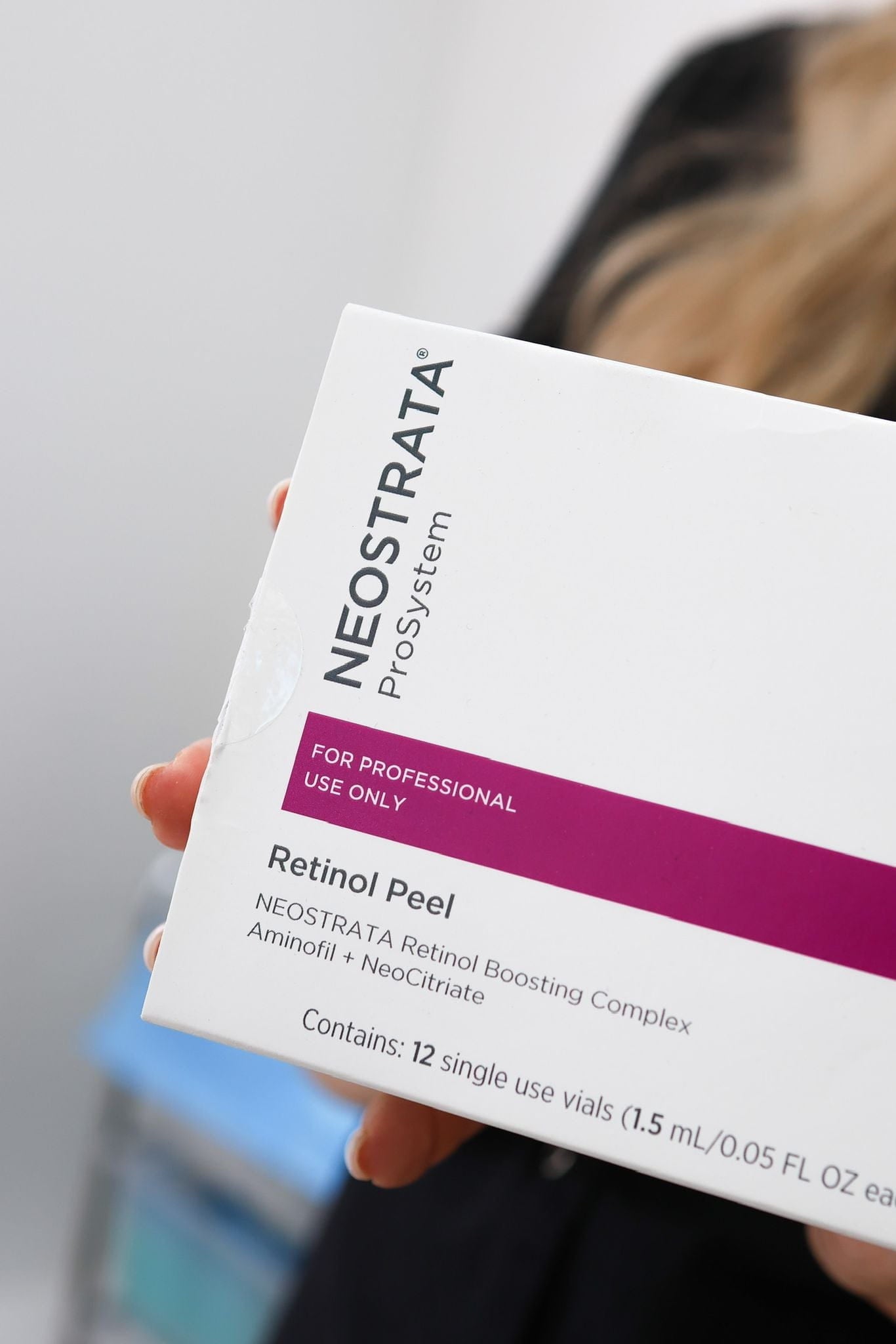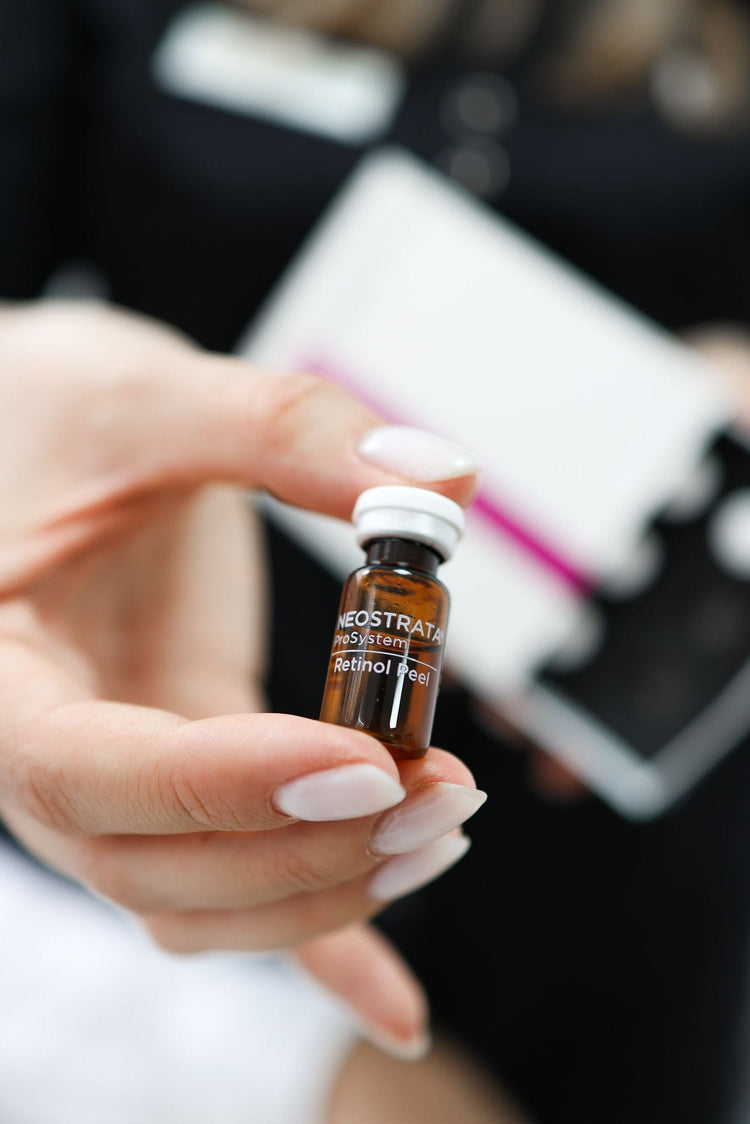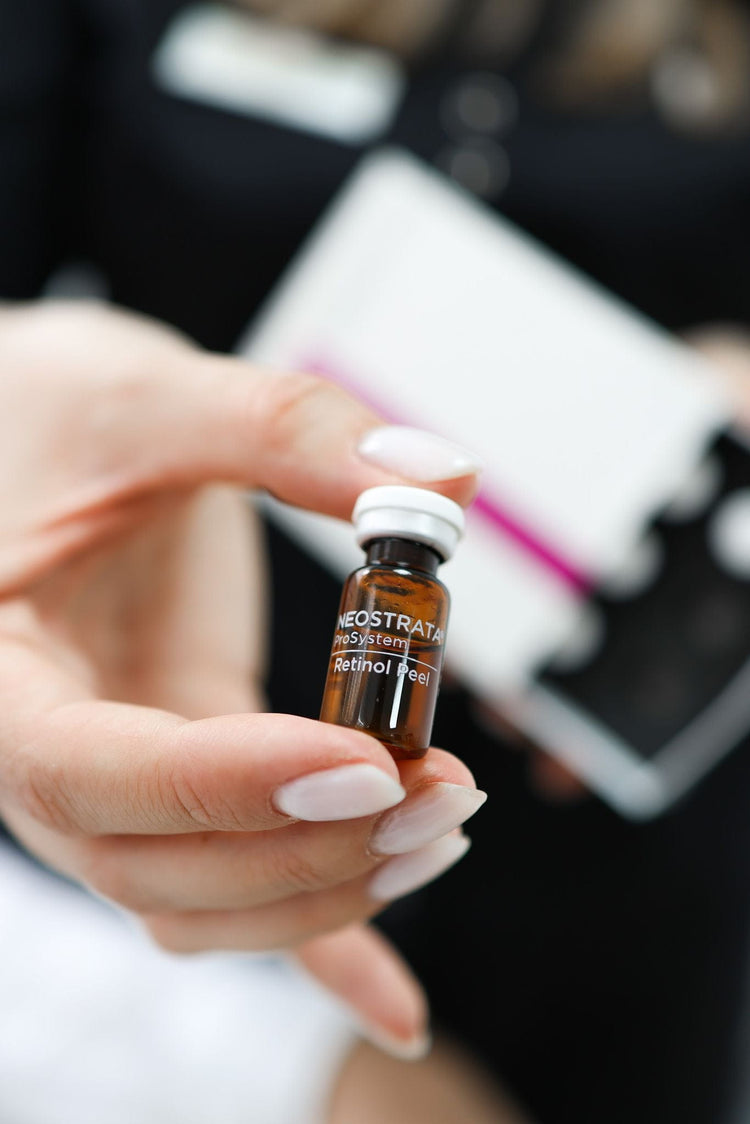Retinol Peel Benefits
Retinol peels have become increasingly popular in the realm of chemical peels, offering a range of potential benefits for those seeking skin rejuvenation.
Skin Rejuvenation
Retinol peels utilize vitamin A derivatives to exfoliate the skin’s surface and stimulate collagen production. Compared to other chemical peels like glycolic acid or salicylic acid peels, retinol peels are generally milder and better tolerated by sensitive skin.
They can effectively address various skin concerns, including fine lines, wrinkles, acne scars, uneven skin tone, and hyperpigmentation. However, it’s important to note that results from retinol peels may be gradual and require multiple sessions for optimal outcomes.
Acne Treatment
Retinol peels are a popular choice for treating acne due to their ability to unclog pores and reduce inflammation. Unlike stronger chemical peels that can irritate sensitive skin, retinol peels offer a gentler approach.
Retinol promotes cell turnover, helping shed dead skin cells that contribute to clogged pores and breakouts. It also helps regulate oil production, minimizing excess sebum that can trigger acne.

Anti-Aging Effects
Comparing retinol peels to other chemical peels in Kingston Upon Thames, it’s clear that retinol offers a gentler yet effective approach to skin rejuvenation.

While glycolic acid and salicylic acid peels are known for their stronger exfoliating properties, retinol’s milder nature makes it suitable for sensitive skin types.
Retinol peels can effectively target fine lines, wrinkles, acne scars, and uneven skin tone, achieving noticeable improvements over time.
Other Chemical Peels Available in Kingston Upon Thames
Kingston Upon Thames boasts a variety of chemical peel options, each with its own unique benefits and target areas. While retinol peels have gained significant popularity for their gentle exfoliation and collagen stimulation, other peels like glycolic acid and salicylic acid offer stronger exfoliating properties suitable for addressing specific skin concerns.
Glycolic Acid Peels
Glycolic acid peels are another popular option in Kingston Upon Thames, known for their deep exfoliating abilities.
They work by dissolving the bonds between dead skin cells, revealing brighter and smoother skin underneath.
Glycolic acid is a type of alpha hydroxy acid (AHA) that effectively tackles issues like fine lines, wrinkles, acne scarring, hyperpigmentation, and uneven skin tone.
Like retinol peels, glycolic acid peels can stimulate collagen production, contributing to a more youthful complexion. However, due to their stronger exfoliating nature, glycolic acid peels may not be suitable for those with very sensitive skin or rosacea.
Salicylic Acid Peels
Salicylic acid peels are another popular choice in Kingston Upon Thames, known for their effectiveness in treating acne and oily skin.
- Salicylic acid is a beta hydroxy acid (BHA) that penetrates deep into pores to dissolve oil and debris, effectively unclogging them and reducing breakouts.
- Like retinol peels, salicylic acid peels can also help reduce inflammation and redness associated with acne.
- They are generally well-tolerated by most skin types, including sensitive skin.
While salicylic acid peels offer benefits for acne-prone skin, they may not be as effective as retinol or glycolic acid peels for addressing fine lines and wrinkles.
TCA Peels
When considering chemical peel options in Kingston Upon Thames, it’s important to understand the unique properties of each type. While retinol peels are known for their gentleness and effectiveness on sensitive skin, other peels like TCA peels offer a more intense approach to skin rejuvenation.
- TCA peels utilize trichloroacetic acid, a stronger exfoliant than those found in retinol or glycolic acid peels.
- TCA peels penetrate deeper into the skin layers, promoting significant collagen production and addressing deeper wrinkles, acne scars, and pigmentation issues.
- Due to their intensity, TCA peels require careful consideration and are typically performed by experienced dermatologists who can assess individual skin types and concerns.
Comparing Retinol Peels to Other Types
When exploring the world of chemical peels in Kingston Upon Thames, one common question arises: how do retinol peels compare to other options? Retinol peels have gained popularity due to their gentle yet effective approach to skin rejuvenation, utilizing vitamin A derivatives to exfoliate and stimulate collagen.
Peeling Depth and Intensity
Retinol peels are generally milder than chemical peels containing glycolic acid or salicylic acid, making them a suitable option for sensitive skin types. While glycolic acid and salicylic acid peels offer stronger exfoliation and can target issues like fine lines, wrinkles, acne scarring, and uneven skin tone, retinol peels promote cell turnover and collagen production more gradually.
The intensity of a chemical peel depends on the type and concentration used. Retinol peels typically involve a superficial exfoliation, targeting the top layers of skin.
Glycolic acid and salicylic acid peels can penetrate deeper into the skin depending on their concentration, with stronger peels resulting in more intense exfoliation and potential downtime.
TCA peels are known for their deep penetration and significant collagen stimulation, leading to dramatic results but requiring careful consideration due to their intensity.
Recovery Time
Retinol peels offer a gentler approach to chemical exfoliation compared to stronger acids like glycolic acid or salicylic acid. They work by promoting cell turnover and stimulating collagen production, which can improve the appearance of fine lines, wrinkles, acne scars, and uneven skin tone.
Glycolic acid peels are known for their deeper exfoliating effects, tackling issues like fine lines, wrinkles, acne scarring, and hyperpigmentation. Salicylic acid peels are particularly effective for acne-prone skin due to their ability to penetrate pores and unclog them.
Recovery time varies depending on the type of peel and its intensity. Retinol peels typically have a shorter recovery period compared to glycolic acid or salicylic acid peels, with minimal downtime.
Glycolic acid peels may require a few days of redness and peeling, while salicylic acid peels usually cause less irritation. TCA peels, due to their depth, often involve longer recovery times with more noticeable side effects.
Suitable Skin Types
Retinol peels utilize vitamin A derivatives to exfoliate the skin’s surface and stimulate collagen production. Compared to other chemical peels like glycolic acid or salicylic acid peels, retinol peels are generally milder and better tolerated by sensitive skin.
They can effectively address various skin concerns, including fine lines, wrinkles, acne scars, uneven skin tone, and hyperpigmentation. However, it’s important to note that results from retinol peels may be gradual and require multiple sessions for optimal outcomes.
Retinol peels are a popular choice for treating acne due to their ability to unclog pores and reduce inflammation. Unlike stronger chemical peels that can irritate sensitive skin, retinol peels offer a gentler approach.
Retinol promotes cell turnover, helping shed dead skin cells that contribute to clogged pores and breakouts. It also helps regulate oil production, minimizing excess sebum that can trigger acne.
Comparing retinol peels to other chemical peels in Kingston Upon Thames, it’s clear that retinol offers a gentler yet effective approach to skin rejuvenation.
While glycolic acid and salicylic acid peels are known for their stronger exfoliating properties, retinol’s milder nature makes it suitable for sensitive skin types.

Retinol peels can effectively target fine lines, wrinkles, acne scars, and uneven skin tone, achieving noticeable improvements over time.
Kingston Upon Thames boasts a variety of chemical peel options, each with its own unique benefits and target areas. While retinol peels have gained significant popularity for their gentle exfoliation and collagen stimulation, other peels like glycolic acid and salicylic acid offer stronger exfoliating properties suitable for addressing specific skin concerns.
Glycolic acid peels are another popular option in Kingston Upon Thames, known for their deep exfoliating abilities. They work by dissolving the bonds between dead skin cells, revealing brighter and smoother skin underneath.
Glycolic acid is a type of alpha hydroxy acid (AHA) that effectively tackles issues like fine lines, wrinkles, acne scarring, hyperpigmentation, and uneven skin tone.
Like retinol peels, glycolic acid peels can stimulate collagen production, contributing to a more youthful complexion. However, due to their stronger exfoliating nature, glycolic acid peels may not be suitable for those with very sensitive skin or rosacea.
Salicylic acid peels are another popular choice in Kingston Upon Thames, known for their effectiveness in treating acne and oily skin.
- Salicylic acid is a beta hydroxy acid (BHA) that penetrates deep into pores to dissolve oil and debris, effectively unclogging them and reducing breakouts.
- Like retinol peels, salicylic acid peels can also help reduce inflammation and redness associated with acne.
- They are generally well-tolerated by most skin types, including sensitive skin.
While salicylic acid peels offer benefits for acne-prone skin, they may not be as effective as retinol or glycolic acid peels for addressing fine lines and wrinkles.
When considering chemical peel options in Kingston Upon Thames, it’s important to understand the unique properties of each type. While retinol peels are known for their gentleness and effectiveness on sensitive skin, other peels like TCA peels offer a more intense approach to skin rejuvenation.
- TCA peels utilize trichloroacetic acid, a stronger exfoliant than those found in retinol or glycolic acid peels.
- TCA peels penetrate deeper into the skin layers, promoting significant collagen production and addressing deeper wrinkles, acne scars, and pigmentation issues.
- Due to their intensity, TCA peels require careful consideration and are typically performed by experienced dermatologists who can assess individual skin types and concerns.
When exploring the world of chemical peels in Kingston Upon Thames, one common question arises: how do retinol peels compare to other options? Retinol peels have gained popularity due to their gentle yet effective approach to skin rejuvenation, utilizing vitamin A derivatives to exfoliate and stimulate collagen.
Retinol peels are generally milder than chemical peels containing glycolic acid or salicylic acid, making them a suitable option for sensitive skin types. While glycolic acid and salicylic acid peels offer stronger exfoliation and can target issues like fine lines, wrinkles, acne scarring, and uneven skin tone, retinol peels promote cell turnover and collagen production more gradually.
The intensity of a chemical peel depends on the type and concentration used. Retinol peels typically involve a superficial exfoliation, targeting the top layers of skin.
Glycolic acid and salicylic acid peels can penetrate deeper into the skin depending on their concentration, with stronger peels resulting in more intense exfoliation and potential downtime.
TCA peels are known for their deep penetration and significant collagen stimulation, leading to dramatic results but requiring careful consideration due to their intensity.
Retinol peels offer a gentler approach to chemical exfoliation compared to stronger acids like glycolic acid or salicylic acid. They work by promoting cell turnover and stimulating collagen production, which can improve the appearance of fine lines, wrinkles, acne scars, and uneven skin tone.
Glycolic acid peels are known for their deeper exfoliating effects, tackling issues like fine lines, wrinkles, acne scarring, and hyperpigmentation. Salicylic acid peels are particularly effective for acne-prone skin due to their ability to penetrate pores and unclog them.
Recovery time varies depending on the type of peel and its intensity. Retinol peels typically have a shorter recovery period compared to glycolic acid or salicylic acid peels, with minimal downtime.
Glycolic acid peels may require a few days of redness and peeling, while salicylic acid peels usually cause less irritation. TCA peels, due to their depth, often involve longer recovery times with more noticeable side effects.
Cost Considerations
Retinol peels are a popular choice for addressing various skin concerns due to their gentle yet effective nature. They are particularly well-suited for individuals with sensitive skin as they cause less irritation compared to stronger chemical peels containing glycolic acid or salicylic acid.
Cost considerations are important when choosing a chemical peel. Retinol peels are generally more affordable than glycolic acid or salicylic acid peels, especially those using higher concentrations. TCA peels, due to their intensity and the expertise required, typically come with a higher price tag.
It’s essential to consult with a qualified dermatologist or esthetician in Kingston Upon Thames to determine the most suitable peel for your individual skin type and concerns. They can provide personalized recommendations and discuss cost options based on the chosen treatment.
- Kratom Energy Drinks: A New Trend In Holistic Wellness - May 31, 2025
- Light Eyes Ultra – Dark Circles Treatment Near Laleham, Surrey - May 30, 2025
- Xela Rederm Skin Booster Treatments Near Chelsham, Surrey - May 29, 2025

